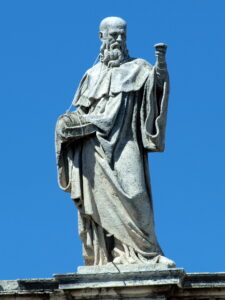Temperance

Definition and Explanation
- Catechism of the Catholic Church, point 1809:
- "Temperance is the moral virtue that moderates the attraction of pleasures and provides balance in the use of created goods."
- Thomas Aquinas' Summa Theologiae, question 141:
- Temperance is the virtue by which man aligns his natural desires with reason, rejecting any animal desires that are not subject to reason.
- Temperance is the perfection of the concupiscible appetite, which is the sensitive appetite that attracts us to goods and repels us from evils.
- Aristotle's Rhetoric, Book I, Chapter 9:
- "Temperance is the virtue that disposes us to obey the law where physical pleasures are concerned."
Examples from Western History and Literature

Penelope to Disguised Odysseus
"The Odyssey" 19.325-334: [F]or how, my friend, will you learn if I in any way / surpass the rest of women, in mind and thoughtful good sense, / if you must attend, badly dressed and unwashed, the feasting / in the palace? Human beings live for only a short time, / and when a man is harsh himself, and his mind knows harsh thoughts, / all men pray that sufferings will befall him hereafter / while he lives; and when he is blameless himself, and his thoughts are blameless, / the friends he has entertained carry his fame widely / to all mankind, and many are they who call him excellent [arete].

Socrates in Plato’s "Symposium"
Alcibiades says, “All this had already occurred when Athens invaded Potidaea, where we served together and shared the same mess. Now, first, he took the hardships of the campaign much better than I ever did––much better, in fact, than anyone in the whole army. When we were cut off from our supplies, as often happens in the field, no one else stood up to hunger as well as he did. And yet he was the one man who could really enjoy a feast; and though he didn’t much want to drink, when he had to, he could drink the best of us under the table. Still, and most amazingly, no one ever saw him drunk” (Symposium 219d-e).
[Aristomedes] saw that the others had either left or were asleep on their couches and that only Agathon, Aristophanes, and Socrates were still awake, drinking out of a large cup which they were passing around from left to right. Socrates was talking to them. Aristodemus couldn’t remember exactly what they were saying––he’d missed the first part of their discussion, and he was half-asleep anyway––but the main point was that Socrates was trying to prove to them that authors should be able to write both comedy and tragedy: the skillful tragic dramatist should also be a comic poet. He was about to clinch his argument, though, to tell the truth, sleepy as they were, they were hardly able to follow his reasoning. In fact, Aristophanes fell asleep in the middle of the discussion, and very soon thereafter, as day was breaking, Agathon also drifted off. But after getting them off to sleep, Socrates got up and left, and Aristodemus followed him, as always. He said that Socrates went directly to the Lyceum, washed up, spent the rest of the day just as he always did, and only then, as evening was falling, went home to rest. (Symposium 223c-d)

Purgatory's Terrace of Gluttony
Purgatorio XXIII.64-75, said by Forse Donati:
All of these souls who, grieving, sing because / Their appetite was gluttonous, in thirst / And hunger here sanctify themselves. / The fragrance of the fruit and of the water / That’d sprayed through that green tree kindles in us / Craving for food and drink; and not once only, / As we go round this space, our pain’s renewed–– / I speak of pain but I should speak of solace, / For we are guided to those trees by that / Same longing that had guided Christ when He / Had come to free us through the blood He shed / And, in His joyousness, called out: ‘Eli.’”
Purgatorio XXIV 145-154, said by Dante:
And like a breeze of May that––heralding / The drawing of the day––when it is steeped / In flowers and in grass, stirs fragrantly, / So did I feel the wind that blew against / The center of my brow, and clearly senseed / The movement of his wings, the air’s ambrosia. / And then I heard: “Blessed are those whom grace / Illumines so, that, in their breasts, the love / Of taste does not awake too much desire–– / Whose hungering is always in just measure.”

Thomas More
Erasmus' Description: He enjoys good, but not rude, health, adequate at any rate to support all the duties of a good citizen, subject to no complaints or very few; there is every hope that he will enjoy long life, for his father is still alive at a great age, but wonderfully active and vigorous for his years. I have never seen a man less peculiar about his food. Until he reached manhood he was content to drink nothing but water, a habit he inherited from his father. Only, for fear of causing any embarrassment in this regard, he used to drink his beer out of the pewter tankard, so that the guests did not know––small beer next door to water, and often just water. As for wine, the habit in those parts being to invite your neighbor to drink in his turned from the same cup, he sometimes barely sipped it, so as not to seem entirely to dislike it, and at the same time to learn to follow common usage… Simple clothes please him best, and he never wears silk or scarlet or a gold chain, except when it is not open to him to lay it aside. He sets surprisingly little store by the ceremonies which ordinary men regard as a touchstone good breeding; these he never demands from other people nor tenders meticulously himself either in public assemblies or in private parties, but he thinks it effeminate and unworthy of the man to waste a good part of his time in such frivolities.
